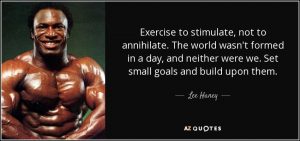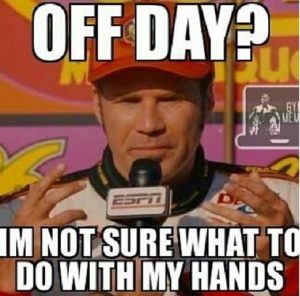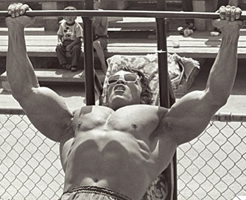If you’ve been training hard for a while, you have probably heard of overtraining. You may have even questioned if YOU are over trained.
Before we go there let’s clear up what overtraining even is.
Overtraining is creating too much muscular damage and central nervous system fatigue for the body to repair as quickly as it normally does. When this happens it comes along with a number of symptoms and impedes your strength and performance.
Some of the signs of overtraining include insomnia, lack of drive to train, weakened grip strength, elevated resting heart rate, fatigue and abnormal muscular soreness.
However, many of these symptoms can also exist if you are new to training and simply deconditioned, and you may only be experiencing them due to lack of exercise and poor nutrition.
So here is how I’m going to kick this off so you can differentiate between being over trained and deconditioned.
If you recently began training (less than one year of hard training) don’t worry about overtraining. You need to be more concerned with developing good habits and training consistently enough to see real results. If you are really weak and deconditioned, then odds are, you aren’t doing enough to truly over train. This doesn’t mean that you should ignore all of my training recommendations and train for 17 hours a day, every day. It just means that if you’re strength training 3-4 days per week for one hour and doing cardio/conditioning for 20-40 minutes on off days the chances of you over training are very small.
Now if you’ve been getting after it for over a year and have seen some significant progress, then there is a chance you can reach a point of overtraining if you’re doing too much and may need to kick it down a notch.
If you’re advanced and have been training for years, then overtraining is certainly something you need to consider.
So, simply put, if you are a complete newbie to the training world, don’t pay too much mind to overtraining. If you have been training hard for AT LEAST one year or more, than you may need to put some thought into avoiding it and follow certain recovery protocols, and here is how you can do that.
- Sleep 7-9 hours per night
I have stressed the importance of sleep over and over again. And today I’m going to do it some more. If you want to be healthy and get the most out of your training you need to get adequate sleep. Not only does your body produce anabolic hormones like testosterone and human growth hormone when you sleep, but it also helps combat disease and strengthens your immune system. Turn off Netflix and get your ass to sleep!
- Drink at least ½ of your body weight in oz. of water daily
Adequate hydration is also imperative to help avoid overtraining and aid in recovery. Muscle tissue is made up of 70% water. If you aren’t supplementing that fluid with a solid supply of purified water every day you can potentially create more damage. At the very least you should be consuming half of your bodyweight in ounces of water daily.
- Stimulate, don’t annihilate
To quote the great Lee Haney, stimulate, don’t annihilate.
Some guys just go way too hard. I was certainly a culprit of this in my early twenties. I would treat every training session like I was going into the fight of my life. I’d crank crazy tunes and go absolutely ape shit for an hour 4 days a week. I’d go as heavy as possible and then hit a fuck-ton of volume for every body part.
I was constantly sore and eventually ended up exhausted all the time, lost muscle and strength. I was definitely over trained and felt like absolute shit.
Now, I’m certainly not suggesting that you don’t train hard. If you want results you gotta put in some hard goddamn work! But there is a line between training hard and training like a clinical maniac.
There is no need to destroy every body part with every set you do. Be smart, avoid training to failure and don’t beat yourself into oblivion every session. Take it from me, you’ll only end up weaker, smaller and constantly tired.
- Get massages, SMR, hot/cold treatment
Take advantage of the benefits of massage, self-myofascial release (foam rolling, using LAX balls, etc.) and contrast baths. Both massage and SMR can help break up scar tissue and replenish the muscle with fresh blood filled with vital nutrients.
Hot/cold treatment is incredible for recovery. The heat will dilate blood vessels which will bring fresh blood and nutrients into the muscle. The cold will constrict the vessels which can help pump out some of the built up lactic acid from training. This can be easily done in the shower if you don’t have access to hot/cold tubs.
- Focus one day per week on recovery
To maximize your recovery, dedicate one day per week to it. Go for a walk, do some light sled dragging, get cryotherapy or a massage, stretch, go through a mobility circuit. Do something to aid in your recovery from training.
- Feeling like shit? Take the day “off”
The whole “no days off” thing you see flooding your social media feed seems to have become quite glamorous these days. The problem is that most of these people are knuckleheads and sometimes you need to take a day off.
Sometimes you’re sick, haven’t slept or just feeling completely exhausted. When shit happens (and shit does happen) you need to be smart and listen to your body. A day off isn’t going to kill you, in fact you will actually benefit more and usually feel tremendous when you get back in the gym the next day.
Please don’t use this as an excuse to be lazy and say “Chris Tutela said I don’t have to train when I don’t feel like it”. That’s not what I’m saying at all. What I am saying is that if you’ve been training your ass off for a long time, sometimes you‘ll need a day to rest. And maybe on that rest day you stretch, do some more SMR work, go for a swim, hike or bike ride or hit a massage or cryo session. For those of you that go 110 mph all the time, you can do something like this rather than continue to roast your CNS even more when you’re feeling off.
- Eat real food
The quality of the foods you ingest play a huge roll in your energy, physique, strength, performance and of course, overall health. If you’re eating shit food you’ll feel like shit and never hit the training goals you’re looking for.
- Avoid training to failure
This goes back to the “stimulate, don’t annihilate” tip. Try to have the last rep of your set look like the first rep; clean, with no one else doing the work for you! If all of your sets end with slow, grinding reps or even worse, missed reps, you’ll only end up working backwards. You’re CNS gets roasted from training that way. Plus, that’s a sure way to NOT build muscle and strength. Don’t waste time. Train smart.
- Deload
If you’re advanced, you should be taking a scheduled deload week every few weeks. Deloading basically means that you will reduce the intensity (percentage of your 1RM) on your big lifts and the total volume of your workout (total sets) for one week. Deloads work wonders for gaining strength, avoiding overtraining and for keeping your joints healthy.
Typically I recommend deloading every 4th week. So 3 weeks hard, followed by a deload. During your deload week you can reduce the total number of your sets by about 40%. So if you were doing 20 total working sets the week prior, you can kick it down to 12. If you’re doing big lifts like the bench, squat, deadlift and military press you can reduce the intensity to 50% of your 1RM. So if you’re 1RM on a squat is 400 lbs, you’d only work with 200lbs when deloading. You can use this weight for 2 sets of 5 reps on deload weeks.
- Schedule one week “off” every 12-16 weeks
If you’ve been going hard for a while, you gotta give yourself a break every now and then. I typically suggest giving the weights a breather every 12-16 weeks. Just don’t use this as an excuse to sit home and eat Milky Ways. Keep your nutrition in check, walk, do some mobility work and low impact activities.
I know that working these 10 tips in will help you feel better than ever. Take advantage of them and take your training and physique to the next level.
Drop a comment below if you have any questions.
Thanks for reading!




